 Petzlover
Petzlover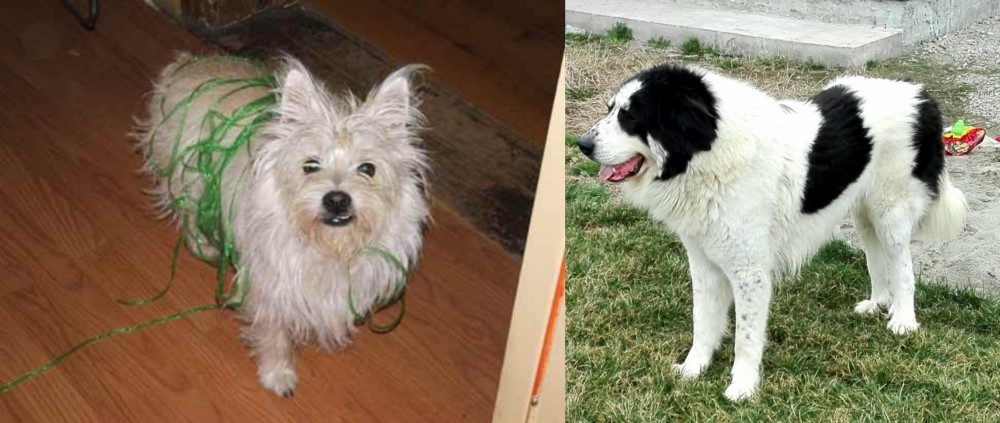 Cairland Terrier is originated from United Kingdom but Ciobanesc de Bucovina is originated from Romania. Cairland Terrier may grow 45 cm / 17 inches shorter than Ciobanesc de Bucovina. Cairland Terrier may weigh 82 kg / 180 pounds lesser than Ciobanesc de Bucovina. Cairland Terrier may live 5 years more than Ciobanesc de Bucovina. Cairland Terrier may have more litter size than Ciobanesc de Bucovina. Cairland Terrier requires Low Maintenance. But Ciobanesc de Bucovina requires High Maintenance
Cairland Terrier is originated from United Kingdom but Ciobanesc de Bucovina is originated from Romania. Cairland Terrier may grow 45 cm / 17 inches shorter than Ciobanesc de Bucovina. Cairland Terrier may weigh 82 kg / 180 pounds lesser than Ciobanesc de Bucovina. Cairland Terrier may live 5 years more than Ciobanesc de Bucovina. Cairland Terrier may have more litter size than Ciobanesc de Bucovina. Cairland Terrier requires Low Maintenance. But Ciobanesc de Bucovina requires High Maintenance
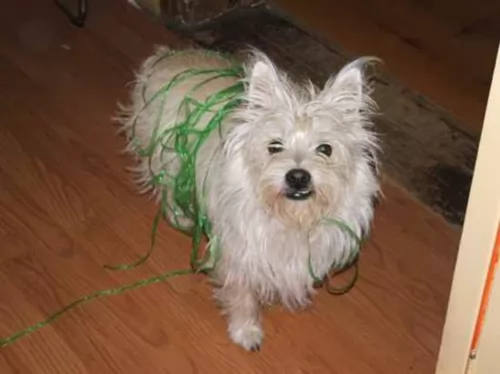 The Cairland Terrier is a cross between the Cairn Terrier and the West Highland White Terrier. It simply means that if you own a Cairland, you’re going to get a little bit of each dog in him.
The Cairland Terrier is a cross between the Cairn Terrier and the West Highland White Terrier. It simply means that if you own a Cairland, you’re going to get a little bit of each dog in him.
This hybrid is a new breed which means you’re not going to get too much documented history on the dog. A tough little hunter of fox and otter, the Cairnland is thought to hail from Scotland.
 The Ciobanesc de Bucovina is a breed that developed naturally in the Carpathian Mountains (Romania and Serbia) and some regions of Bulgaria. The breed was especially useful in the Romanian northeast regions, the county Bucovina and in the northeastern region of Serbia. These dogs are bred for guarding and herding of flocks as well as guard dogs for the family home.
The Ciobanesc de Bucovina is a breed that developed naturally in the Carpathian Mountains (Romania and Serbia) and some regions of Bulgaria. The breed was especially useful in the Romanian northeast regions, the county Bucovina and in the northeastern region of Serbia. These dogs are bred for guarding and herding of flocks as well as guard dogs for the family home.
When the area was split between Russian and Romania, the dog continued to thrive in the mountains because of the need that the shepherds had for this type of dog with the build, working ability and temperament of the Bucovina.
Finally, in the 20th century, Romania began to urbanize and industrialize. People moved to the cities from the hills and many brought their dogs with them. This allowed many non-mountain Romanians to come into contact with the Bucovina Shepherd for the first time. He became a great family dog and offered guard dog protection as well.
The Romanian Kennel Club accepted the Ciobanesc du Bucovina in 1982 and wrote the first standard then. It has since been updated in 2001 and 2002 with today’s standard. They are not accepted by the international clubs nor the big clubs in the US and Europe. This is one factor in keeping the breed rare because it is little known outside of Romania.
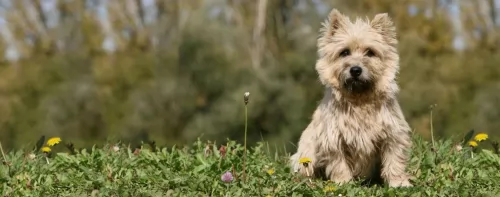 The Cairland Terrier is a small dog standing anything between 20 and 35cm in height and weighing in at roughly 4 to 10kg. He has short legs, a compact little body, while being muscled and strong. He has small erect ears with a shortish upright tail.
The Cairland Terrier is a small dog standing anything between 20 and 35cm in height and weighing in at roughly 4 to 10kg. He has short legs, a compact little body, while being muscled and strong. He has small erect ears with a shortish upright tail.
The color of the medium length coat can be fairly varied which means brown, black, cream, fawn, brindle or even white from the Westie. The dog has two coats with the topcoat being fairly harsh, coarse and straight to slightly wavy while the undercoat is soft.
When it comes to temperament, the Cairland Terrier is social and feisty with a high self-esteem. He has a strong personality and can be somewhat stubborn but he is a great friend of children in the home. He just loves to take part in all their games.
With training and socialization which he undergoes easily, he will get on well with other pets too, although he can become aggressive with other dogs in his territory.
 Most large mountain dogs resemble the Bucovina Shepherd, but this breed is more slightly built and has a lighter coat than most of the mountain dogs. They are still a very large dog weighing in between 70 and 120 pounds. They are powerfully built even if more slender than other mountain dogs. They have a long thick coat that makes it difficult to see how their bodies are formed, but they are a very muscular dog.
Most large mountain dogs resemble the Bucovina Shepherd, but this breed is more slightly built and has a lighter coat than most of the mountain dogs. They are still a very large dog weighing in between 70 and 120 pounds. They are powerfully built even if more slender than other mountain dogs. They have a long thick coat that makes it difficult to see how their bodies are formed, but they are a very muscular dog.
Their large head does indicate how powerful a dog he is, and he has a wide muzzle that tapers off at the end. The breed has small eyes that are either hazel or brown and his v-shaped ears hang downward on the side of his head. He has a wide, black nose and thick, dark lips. His tail is bushy and long.
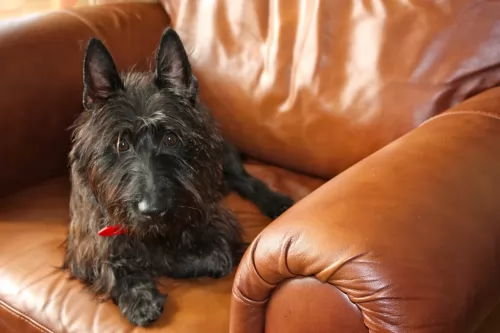 Terriers are dogs that are full of character and self-confidence, and your Cairland Terrier is no different. These small dogs in the Terrier group don’t actively look for a fight with other dogs, but if they are provoked, they aren’t intimidated and will give bigger dogs a piece of their mind. They make splendid pets and will always be ready for a game.
Terriers are dogs that are full of character and self-confidence, and your Cairland Terrier is no different. These small dogs in the Terrier group don’t actively look for a fight with other dogs, but if they are provoked, they aren’t intimidated and will give bigger dogs a piece of their mind. They make splendid pets and will always be ready for a game.
Make sure that your Cairland Terrier remains the feisty little character he is by making sure he gets well looked after. Dogs aren’t known as man’s best friend for nothing, and in exchange for the care you give your Terrier, you’ll be rewarded by a loyal and devoted friend.
 Bred to herd and guard cattle against the wolves and bears, it is a very dominant, self-assured, breed. They are intelligent yet laid back when no threat is suspected. They love children but can be hard to train. A dominant adult is needed to train and control the Ciobanesc de Bucovina. They are quite protective of their families and will patrol the property if left outside at night.
Bred to herd and guard cattle against the wolves and bears, it is a very dominant, self-assured, breed. They are intelligent yet laid back when no threat is suspected. They love children but can be hard to train. A dominant adult is needed to train and control the Ciobanesc de Bucovina. They are quite protective of their families and will patrol the property if left outside at night.
The breed has a strong mistrust of strangers but loves his adopted family. Unless threatened the Ciobanesc de Bucovina is calm and chilled. He is loyal, affectionate and dedicated. They attempt to frighten strangers with barks and growls but will attack if necessary. They are also very driven to chase prey so make sure they are in a locked fence. They can be difficult to train and seem to need a strong, alpha adult presence.
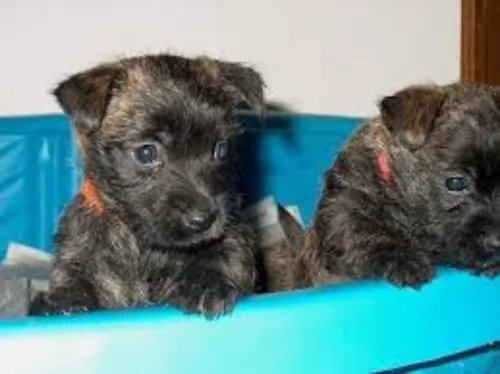 Your Cairland is a tough, feisty little dog and you’re not going to find yourself constantly having to take him to the vet. However even healthy dogs can be affected by ill health, and we look at a couple of illness you want to watch for with your Terrier.
Your Cairland is a tough, feisty little dog and you’re not going to find yourself constantly having to take him to the vet. However even healthy dogs can be affected by ill health, and we look at a couple of illness you want to watch for with your Terrier.
This can be brought on by a change in diet. Usually you can keep food away from your pet for 24 hours, allowing the stomach to empty and to settle. However, if there is blood in the diarrhoea or your dog is vomiting, then veterinary advice must be sought.
Just like humans, a dog can have an allergy to pollen where you see watering of the eyes as well as sneezing. This is because of inflammation of the mucous membranes in the nose. Your vet can ease the problem for your pet.
 Not much has been done to study the health of this breed so not much is known for certain. It is known that they have good health as they have survived the harsh winters in the mountains while tending to the flocks.
Not much has been done to study the health of this breed so not much is known for certain. It is known that they have good health as they have survived the harsh winters in the mountains while tending to the flocks.
Given their size and the history of mountain dogs, they could be susceptible to visual and skeletal amount of food and at the right times can prevent this. They could be susceptible to arthritis, knee and elbow dysplasia, and cataracts.
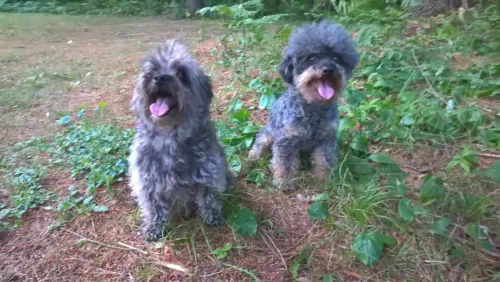 Because the Cairland Terrier is a hybrid breed, the coat can be wiry or soft, but it’s a low maintenance coat. He will need to be brushed twice a week. Some people take their Cairland to have the coat professionally trimmed while others buy a special stripping tool and they strip the hair a couple of times a year.
Because the Cairland Terrier is a hybrid breed, the coat can be wiry or soft, but it’s a low maintenance coat. He will need to be brushed twice a week. Some people take their Cairland to have the coat professionally trimmed while others buy a special stripping tool and they strip the hair a couple of times a year.
Small dogs are prone to dental disease, so you will need to brush your Cairland’s teeth at least two or three times a week. Dental disease is a serious problem with dogs and it won’t only affect the teeth and gums but it can result in infection which can contribute to organ failure. Periodontal disease is always a big problem with little dogs. If you’re not sure how to go about looking after your dog’s teeth, you can always take your dog to the vet for dental check-ups and cleaning.
 It is important not to over feed or to feed to much at one time. Even though they are large and powerful dogs, massive meals can cause bloat, so you are better off with 2-4 smaller meals per day. Also, don’t feed right before or right after strenuous exercise.
It is important not to over feed or to feed to much at one time. Even though they are large and powerful dogs, massive meals can cause bloat, so you are better off with 2-4 smaller meals per day. Also, don’t feed right before or right after strenuous exercise.
As previously mentioned this breed does not appear to have many health issues. As they developed naturally in the mountains they have not been exposed to many things there.
This was already mentioned but it is a very serious condition and requires veterinary assistance immediately under threat of death.
They can have either hip or elbow dysplasia. Can lead to arthritis of lameness.
This is a calm, even tempered dog not needing a lot of exercise. However, he is a big dog and can get obese without daily exercise. A large fenced in yard would be appreciated and a nice brisk walk every day. They would probably enjoy flyball and leurcatch. Any herding or hunting would be enjoyed.